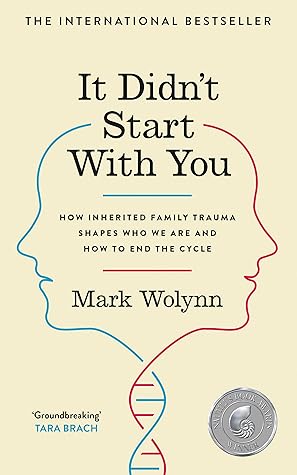More on this book
Community
Kindle Notes & Highlights
by
Mark Wolynn
Read between
September 27 - October 7, 2023
A human being is a part of the whole … [though] he experiences himself, his thoughts and feelings, as something separated from the rest—a kind of optical delusion of his consciousness.
we’re connected to people in our family history whose unresolved traumas have become our legacy.
Although Jesse was only imagining this conversation with his uncle, brain research shows that Jesse was actually activating the same neurons and regions in the brain that would be activated if he were actually having this healing experience with his uncle in person.
when we visualize a healing image, we activate the same regions of the brain—specifically in the left prefrontal cortex—that are associated with feelings of well-being and positive emotion.1
Insight is often gained when we are willing to tolerate what’s uncomfortable in the quest to understand ourselves.
When we place our hands on our body and direct our words and breath inside, we support the parts of ourselves that feel most vulnerable.
When we have rejected, judged, blamed, or distanced ourselves from either parent, the reverberations are felt in us as well. We might not be consciously aware of it, but pushing a parent away is akin to pushing away a part of ourselves.
When we cut ourselves off from our parents, the qualities we view as negative in them can express in us unconsciously.
we do to ourselves what we feel was done to us.
our judgments can forge the foundation of our compassion.
Feeling at peace with ourselves often begins with being at peace with our parents.
Is there one memory, one good intention, one tender image, one understanding, one way your parents express love, that you can let in?
You can’t change what was, but you can change what is, as long as you don’t expect your parents to change or be any different from who they are. It is you who must hold the relationship differently. That’s your work. Not your parents’ work. The question is: are you willing?
Reconciliation is mostly an internal movement. Our relationship with our parents is not dependent on what they do, how they are, or how they respond. It’s about what we do. The change occurs in us.
love him just as he was.
When you can observe your reactions to stress, you can monitor and give yourself what you need in the very moments you most need it.
when you can breathe deeply enough to know what you’re feeling in your body, you don’t have to leave it.
life is passed to us from our parents, essentially laying a blueprint for how we make sense of our lives. This blueprint begins in the womb and takes shape even before we are born. During this time, our mother is our whole world, and once we’re born, her touch, her gaze, and her smell is our contact with life itself.
While we are too small to make sense of life on our own, our mother reflects our experiences back to us in doses we can ingest and assimilate.
During gestation, infancy, and early childhood, our brain is not equipped to put our experiences into story form so that they can be made into memories. Without the memories, our unmet longings can play out unconsciously as urges, cravings, and yearnings that we seek to satisfy through our next job, our next holiday, our next glass of wine, and even our next partner.
the fear and anxiety of an early separation can distort our reality, making our difficult and uncomfortable situations feel catastrophic and life-threatening.
The vulnerability of needing another person was so terrifying that each time she took another step into her desire, she was met by a deeper level of her fear. Unable to link this conflict to her childhood, she found fault with every man who attempted to love her, often leaving them before they could leave her.
When our early experience with our mother is disrupted by a significant break in the bond, shards of pain and emptiness can shred our well-being and disconnect us from the fundamental flow of life.
What we feel we didn’t get from our mother, what remains unresolved in our relationship with her, often sets the stage for what we experience with our partner.
How could your core sentence limit your relationship? How does it affect your ability to commit to a partner? Are you able to remain vulnerable when the two of you are together? Or do you shut down, fearful of being hurt?
When we reject our mother, we can unconsciously distance ourselves from the comforts of life. Security, safety, nurturance, care—all the elements associated with mothering—can feel missing in our lives.


